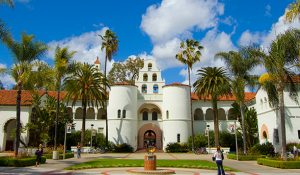
San Diego State University has always been a brainy campus, and its psychology research funding backs that up: For fiscal year 2016, SDSU’s psychology department ranked third among California universities in funding from the National Institutes of Health (NIH)—the field’s primary funder—and 19th among universities nationwide. Between new awards and continued funding for existing awards, SDSU psychologists received more than $7 million from the agency in FY16.
Among the biggest NIH grants awarded to SDSU psychology faculty in 2016 were:
- Linda Gallo‘s award to study the relationship between neighborhood environment and metabolic disorders in Hispanics/Latinos
- Phillip Holcomb’s award investigating the neural dynamics of certain types of reading in deaf readers
- Inna Fishman’s award to delve into the early neural signatures of autism spectrum disorder using advanced brain imaging techniques.
Psychology department chair Georg Matt credits the department’s NIH funding success to years spent recruiting researchers who fit SDSU’s teacher-scholar model.
“Over the past 30 years, our department has developed an identity and mission that prioritizes the hiring of faculty members who want to be excellent scholars and teachers and have the capacity to do both,” Matt said.
He added that the department’s research strengths—namely, cognitive and brain science, “prevention-to-intervention” health science, and the effects of diversity and culture on cognition and well-being—align well with NIH’s funding priorities.
With the completion of SDSU’s Engineering and Interdisciplinary Sciences (EIS) Complex early next year, the faculty can expect to be even more competitive for federal funding from NIH and other agencies. The EIS Complex will host shared research space to encourage cross-disciplinary collaborations, add new lab space for faculty and graduate students, and house the university’s first brain imaging station—all of which will allow SDSU psychologists and other researchers to show funding agencies they’re capable of tackling society’s toughest problems.

